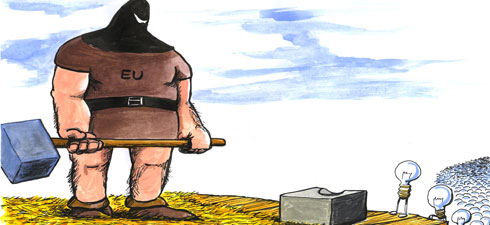At last, a real crisis. The Franco-German salvage operation for the eurozone was inevitable for the simple reason that Armageddon never happens. Nicolas Sarkozy and Angela Merkel patched together yet another "temporary" bail-out for the Greeks, and will do so for the Portuguese and Irish if need be. German taxpayers will pay the Greeks' bills and aid Europe's banks as they continue to profit from 20% interest on their sovereign loans. Power always wins, so long as it can get someone else to pay.
A more intriguing crisis erupts in Britain. The chancellor, George Osborne, showed impressive cynicism in abandoning his opposition to a "two-speed" Europe and demanding that the eurozone move swiftly to fiscal union – with Britain firmly outside. Only such a union, he said, would discipline the debtor nations and thus avoid bank anarchy that would spill over into the British economy. Britain would have no part in any rescue, but it relied on the eurozone to continue on its path to ever closer union.
Cynical Osborne may be, but he is right in his historical analysis. The latest Greek bailout is the moment when continental Europe finds itself forced to transmogrify from a loose federation into a brittle unitary state. If European politics starts to implode and return to xenophobia, manned borders, ethnic cleansings and trade boycotts, that start is now. This is a true turning point.
From the earliest days of European union after the second world war, such a point was the greatest danger. As long as national currencies could move flexibly in a climate of free trade, Europe's extraordinarily diverse political economy could enjoy a "variable geometry". The safety valve of devaluation allowed countries to adjust over time. Their distinctive autonomies and political cultures could survive.
That safety valve is now turning off. Huge subsidies must flow from high-performing to low-performing countries within the eurozone to pay government bills, support projects and finance sovereign debts. In their wake come bureaucratic intervention and fiscal discipline. This means harmonised taxes, harmonised enforcement, harmonised regulation and harmonised government, only distantly accountable to electorates. Once monetary union was introduced, back in 1999, the rest had to follow. Read full article in the Guardian...
Was this article useful? If so we are delighted!
It is freely available because we believe that the right to free and independent information is essential for democracy. But this right is not guaranteed forever, and independence comes at a cost. We need your support in order to continue publishing independent, multilingual news for all Europeans.
Discover our subscription offers and their exclusive benefits and become a member of our community now!












